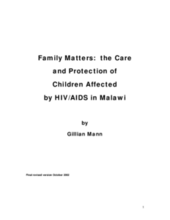This case study is one of a number commissioned by the Save the Children Alliance as part of the Care and Protection of Separated Children in Emergencies project (CPSC). It was designed to complement a series of other studies which focused on children separated from their families in the context of armed conflict and forced migration. It was felt that the perspectives and experiences of children who live without their parents as a result of HIV/AIDS could inform and be informed by the experiences of war-affected children in various countries around the world. It was also hoped that indepth information from children affected and infected by HIV/AIDS could provide some insight into how boys and girls understand the many facets of HIV/AIDS so that future interventions could be more effectively targeted. This study particularly focuses on the work of COPE in Malawi, a programme of Save the Children USA which mobilises communities to respond to a range of issues stemming from the AIDS epidemic. Although this research was not an evaluation of this programme, it was hoped that, by using research methods which would elicit detailed information from children, it would be possible to formulate some conclusions for future interventions. In total, the study reached 165 informants in three communities, including many children from the age of 8 and upward. A great deal of the research time was spent with children aged between 8 and 12 who participated in workshops which used a range of participatory techniques. Individual interviews and focus group discussions were also held with older children, guardians and other adult members of the communities.
This case study provides a description of the COPE programme and of the activities at the community level which stem from it: it examines the cascade model in which capacity building and training are undertaken at various levels based on existing government-endorsed District, Community and Village level AIDS Committees. The COPE programme model encourages and facilitates community ownership of the problems stemming from HIV/AIDS, an approach widely regarded as the most cost-effective and sustainable way to address the magnitude of the problem nationwide. In Malawi and globally, the vast majority of children rendered parentless by AIDS are living within the extended family. This study examines the various reasons why such children are, or are not, taken in by their relatives. A remarkable discrepancy was found in the views of adults and children: while adults tended to believe that children should play no part in the decision-making around their care, children themselves expressed clear and well-considered opinions on the characteristics of the most suitable care arrangements, and these vary significantly from those of adults. While adults emphasised the material capacity of a family to care for an orphaned child, children were much more concerned about being cared for by adults who would love them and respect the honour of their deceased parents. This led to a strong preference for care by grandparents, even if this meant living in extremely poor material and economic circumstances.
©Save the Children Sweden

